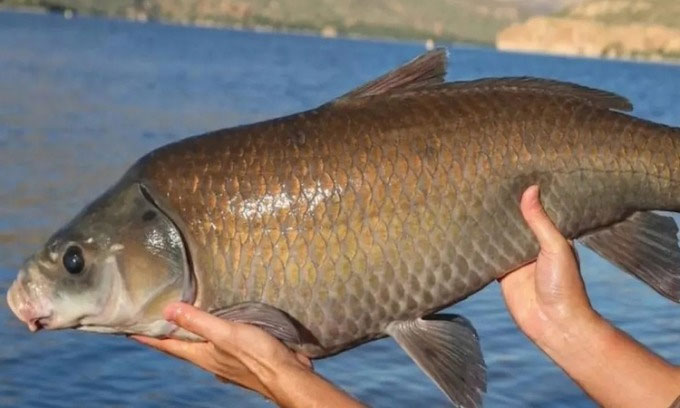US Desert Lake Contains Buffalo Fish Over 100 Years Old
Researchers found that many individuals of three species of buffalo fish survived from 1918 to the present, most likely due to environmental isolation and evolutionary adaptation.
Fish can be found in oases, streams, or other bodies of water in the desert, often living in isolated and specialized conditions that allow them to adapt to harsh environments. The study, published in the journal Scientific Reports, focused on fish that live in Apache Lake in the southwestern Arizona desert, including largemouth buffalo, smallmouth buffalo, and black buffalo. These fish are members of the genus Ictiobus, according to Alec Lackman , an ichthyologist and co-author of the study, Interesting Engineering reported on November 5.

A buffalo fish that has lived for a century in Apache Lake. (Photo: University of Minnesota Duluth)
To determine the age of the buffalo fish, the team extracted otoliths from the fish's skulls. Otoliths are tiny, rock-like structures that grow continuously throughout the fish's life, adding a new layer each year. Scientists can measure the age of the fish by analyzing the otoliths with a compound microscope and counting the layers like tree rings. The discovery suggests that some buffalo fish introduced to Arizona in 1918 are likely still alive today.
To confirm the results, the research team also applied radiocarbon dating. Among the analyzed individuals, five were over 100 years old, surprising scientists with the vitality of this fish species. Furthermore, older buffalo fish individuals are less stressed and have a more effective immune system, which was evident when analyzing their blood: the ratio of neutrophils and lymphocytes in the blood was low.
In 2019, a 10 kg individual was caught in Pelican Rapids, Minnesota, USA, with a recorded lifespan of up to 112 years. In January 2023, the research team also discovered a 127-year-old individual in Saskatchewan, Canada. This makes the largemouth buffalo fish one of the longest-lived freshwater fish species in the world. According to the research team, the largemouth buffalo fish has adapted to survive in a long reproductive cycle when facing harsh environments, up to 50 years without reproducing in unfavorable conditions.
"Originally raised in breeding farms and stock ponds along the Mississippi River in the Midwest, the government stocked buffalo fish in Lake Roosevelt (upstream of Apache Lake), Arizona in 1918 ," the team said.

This fish has evolved the ability to live long to compensate for long periods of non-reproductive life.
Lake Roosevelt became a commercial fishery over time, but the fish population in Lake Apache remained largely unaffected. Only recently did fishermen discover an effective way to catch buffalo fish in Lake Apache using pole and line. Some catch-and-release fishermen began to notice the unusual black and orange markings on their catch, prompting an effort to study the pattern. They contacted Lackmann to conduct scientific analysis of some of the fish, eventually finding out how long freshwater fish in the desert lake lived.
Not only are largemouth buffalo fish incredibly long-lived, they are also tolerant of high turbidity and low oxygen levels. This resilience allows them to remain vigorous in water conditions with dissolved solids as high as 200 ppm.
However, one of the challenges facing this fish species is human activities such as dam construction, which disrupt their reproductive cycle.
Although the largemouth buffalo fish is not listed as a protected species in the United States, scientists in Canada have focused on studying the species in the hope of raising public awareness. Largemouth buffalo fish are often mistaken for carp, a harmful invasive species, and are considered 'trash fish' because they are not popular as food. However, their persistence is an important contribution to local ecosystems and is of interest to scientists studying vertebrate longevity.
- Chinese desert freshwater lake gradually disappears
- Lake water 2000 years strange between arid desert
- Detected 112-year-old freshwater fish in the US
- Discover the origin of the ancient lake under the desert
- Turkmenistan built lakes in the desert
- Some fish species live in the harshest place on earth
- Sahara Desert Suddenly Flooded by Thunderstorms, Lake Dry for 50 Years Now Filled with Water
- Lakes appear across the Sahara desert after floods
- Mysterious lake in the desert
- Building a huge lake system in the desert
- The world's most expensive bent horns cost $ 12 million
- Giant buffalo weighs 1.5 tons, costs more than 69 billion VND
 'Fine laughs' - Scary and painful torture in ancient times
'Fine laughs' - Scary and painful torture in ancient times The sequence of numbers 142857 of the Egyptian pyramids is known as the strangest number in the world - Why?
The sequence of numbers 142857 of the Egyptian pyramids is known as the strangest number in the world - Why? History of the iron
History of the iron What is alum?
What is alum?